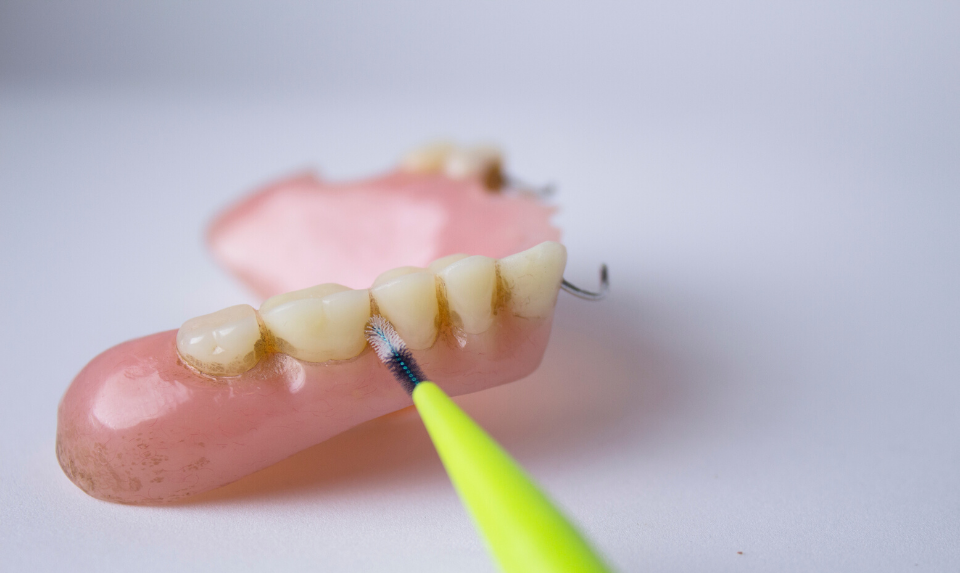How Do You Take Care of Your Dentures?
Dentures or false teeth are removable devices that can replace missing teeth and help bring back your smile. If you have lost most of your natural teeth, whether, from tooth decay, gum disease, or injury, replacing missing teeth with dentures will greatly benefit your appearance and your health. That is because dentures make it easier to speak and eat better than you could without teeth.
Nevertheless, proper denture care is crucial for both the health of your mouth and dentures. Here are some suggestions.
- Handle them with extreme care. To evade unintentionally dropping them, stand over a full sink of water or a folded towel when cleaning.
- Brush and rinse them every day, but not with toothpaste. Toothpaste is harsh and produces microscopic marks where food and plaque can build up. Like real teeth, dentures must be brushed regularly to eliminate plaque and food. Brushing aids prevent the growth of tough stains on the dentures. Utilize a brush with soft bristles that are specially designed for washing false teeth. Do not use a hard-bristled brush as it may break or wear down dentures. Mildly brush every surface of the denture and be mindful not to scratch the plastic or curve attachments. In between brushings, clean dentures after each meal.
- Clean with a denture cleaner. Mild dishwashing liquid or hand soaps can be applied for washing dentures. Household cleaners and some toothpaste may be too harsh for dentures and shouldn’t be applied. Also, do not use bleach, as this may bleach the pink part of the denture. Ultrasonic cleaners can be applied to care for your false teeth. These cleaners are tiny bathtub-like devices that include a cleaning solution. The denture is soaked in the tub, and then sound waves produce a wave motion that removes the undesirable deposits. The use of an ultrasonic cleaner, however, does not substitute a thorough regular brushing.
- Take extreme care of dentures when not using them. Dentures require to be stored moist when not being used, so they do not dry out or lose their shape. When not being used, dentures should be stored in a denture cleanser soaking solution or in water. But, if the denture has metal accessories, the accessories could smudge if placed in a soaking solution. Your dentist can suggest the best practices for caring for your appropriate denture. Dentures should not be placed in hot water, which can make them bend.

Can I Repair or Adjust Dentures?
One or more follow-up schedules are usually needed soon after acquiring false teeth for any needed adjustments. Never try to adjust or fix dentures yourself. Never twist any part of the clasp or metal attachments on your own; doing so can soften the metal arrangement. “Do-it-yourself” repair kits can permanently harm dentures, and over-the-counter adhesives may include harmful substances.
False teeth that don’t fit correctly can cause sensitivity and sores in the mouth and on gums. Be sure to talk to your oral health care provider if a denture cracks, chips, or breaks or if one of the teeth fits loose. Oftentimes, your provider can perform the needed adjustment or fix the same day. For some complex repairs, your denture may have to be forwarded to a specialized dental laboratory.
Will My Dentures Need to Be Replaced?
Over time, they will require to be rebased, remade, or relined because of natural wear and natural age-related changes to the face, gums, and jawbones or if the dentures are wobbly. To rebase or reline a them, prosthodontist or the dentist refits the denture base or makes a new denture base and reuses the actual teeth. Usually, full dentures should be utilized for 5 to 7 years before a replacement is needed.
How Do I Take Care of My Gums and Mouth if I Have False Teeth?
Even with complete set of false teeth, it is necessary to brush your gums, tongue, and palate with a soft-bristled brush each morning before putting the dentures in. This eliminates plaque and stimulates flow in the mouth. Pay consideration to clean teeth that fit beneath the denture’s metal clasps. Plaque that becomes caught under the pins will raise the chance of tooth decay.
If you use a partial denture, be sure to remove it before brushing real teeth. Clean, massage, and rest your gums regularly. Rinsing your mouth every day with warm salt water will further clean the gums. Eat a well-balanced diet to keep proper nutrition and a healthy mouth.

How Frequently Should I Visit the Dentist?
If you own dentures, your prosthodontist or dentist will tell you about how frequently to visit, and every six months should be the average. Dental visits are required so your dentures and your mouth can be checked to guarantee denture fitting, look for symptoms of oral diseases including cancer, and to have teeth professionally cleaned.



